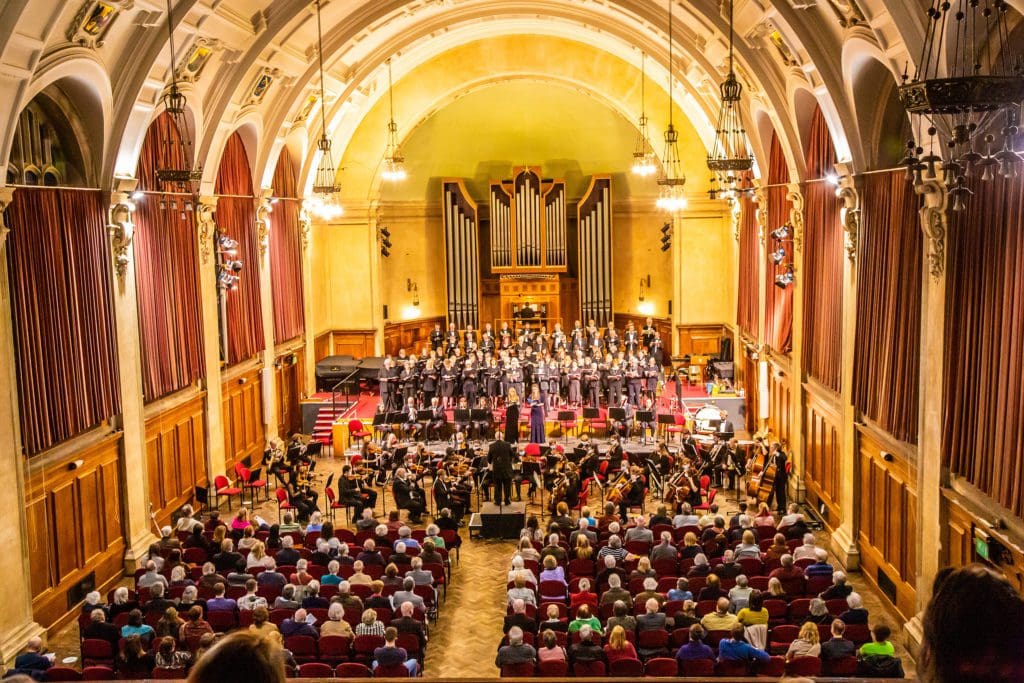Bangor University’s November concert will be a celebration of the musicians who have taught, studied and shared their creative talents over the last century.
As the university celebrate 100 years of music-making, the next concert at Prichard-Jones Hall on Sunday evening 27 November at 7.30pm will include works by E T Davies, Dilys Elwyn Edwards, John Hywel, Caradog Roberts and William Mathias.
The concert will be led by Bangor University’s director of Music, Gwyn L Williams and Leader Chris Atherton, with solos from soprano Sioned Terry, the tenor Robyn Lyn Evans and baritone Jeffrey Williams.
“Our concert marks one hundred years of music at the University, a century which began with the appointment, in 1921-22, of E T Davies as the very first full-time Director of Music,” explains Gwyn L Williams.
E T Davies’ most famous song Ynys y Plant, beloved of so many generations of sopranos, will be performed in the orchestral version by Arwel Hughes. It also includes arguably one of the most famous Welsh song of all time: Mae Hiraeth yn y Môr, written by Dilys Elwyn Edwards who taught piano at the Music Department here in Bangor.
“Her song is easily at home on the world’s concert stages, as indeed it is in village halls during local eisteddfodau,” explains Gwyn L Williams. “It eclipses, perhaps unfairly, her beautiful song Cloths of Heaven, which has been especially orchestrated for this concert by Welsh composer Mared Emlyn, herself a Bangor alumna.”
The programme will also include works by Caradog Roberts and William Mathias. “50 years separate Caradog Roberts and William Mathias in Bangor,” explains Gwyn L Williams. “Caradog Roberts was part-time Director of Music between 1914 and 1929; William Mathias was appointed Professor of Music in 1970. Just half a century between them, and their music couldn’t be more different. But, then, how could art and music be the same after Passchendaele, Dresden, Hiroshima and Auschwitz?”
“The music of Caradog Roberts is rooted in the nineteenth century and its notions of empire and Christianity. William Mathias began composing in a totally new, and reversed, Britain. Much of the Empire flocked here in response, at the end of the Second World War, to a government call for people to help rebuild a shattered country. And the Windrush generation brought more than workers, it also brought their culture and their music, all dominated by joyous colours, music and rhythm. Previously interested in jazz (although quite possibly refracted through the music of Gershwin), William Mathias became fascinated by Caribbean music. And it shows in the harmonies, the rhythms and the orchestral scoring of This Worlde’s Joie, which will be performed by the Chorus together with local ensemble Cantorion Menai. It’s also interesting to note that the medieval texts that Mathias set to music were compiled with the help of William Tydeman, who was Professor of English in Bangor and a contemporary of the composer at the University.”
The Bangor University Symphony Orchestra will also perform the Rondo for Orchestra – composed by John Hywel for performance by the BBC National Orchestra of Wales.
Gwyn L Williams explains, “In the 1960s John Hywel was appointed a music lecturer at the University, a role he held for 30 years, becoming Professor before he retired. Were it not for him, our orchestra and chorus would not exist today. Although a full-time lecturer, he still found time to fulfil the role of Director of Music. He revitalised the orchestra and chorus, and forged valuable connections for both ensembles, between staff, students and the community. The University Symphony Orchestra and Choir are still made up of “town and gown”, and they continue to breath music and life into the magnificent Prichard-Jones concert hall that we rehearse and perform in.”

